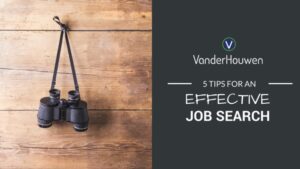Why It’s Essential to Work with a Recruiter
With the average corporate job posting receiving around 250 applicants, it can be hard to stand out among the crowd. From that pool of applicants, only four to six individuals will be invited for an interview.
These odds can be daunting, and though you have implemented job search strategies such as updating your LinkedIn profile and actively participating in networking groups, it may seem like your progress is slower than you'd like. Your next step? Partner with a recruiter.
Working with a recruiter can offer many advantages during your job search journey, especially if you find someone who is genuinely focused on finding the best job and company match for you. Our guide will teach you about the role of a recruiter, reasons to work with one, and how to ask questions to find the right recruiter for you.
Skilled recruiters will work closely with hiring managers to understand not only the requirements of the job opening but the dynamics of the team, current and future projects, and the specialized attributes they are seeking in a new hire. They'll be able to share this insider information you wouldn't otherwise find on the company's website or in the job description. They'll also be able to determine how your specific skills align with the company's needs to be sure you both believe it's a good job match before they represent you for the position (TIP: A recruiter should always get your permission before sending your resume to their client).
A recruiter who knows your unique skills will be able to describe them in rich detail to the hiring company, which gives you a competitive edge in the consideration process.
Working with a recruiter can offer many advantages during your job search journey, especially if you find someone who is genuinely focused on finding the best job and company match for you. Our guide will teach you about the role of a recruiter, reasons to work with one, and how to ask questions to find the right recruiter for you.
What's the Value of a Recruiter?
An external recruiter is contracted by companies to search for and find the best candidates for their open positions. Companies outsource recruitment services when they need support filling roles quickly or when jobs require specialized skill sets. Some activities a recruiter performs on behalf of the company include:- Meeting with the hiring manager to gain a clear understanding of the requirements for their open position
- Looking for candidates who would be a good fit for the position, including conducting pre-screening interviews
- Presenting all qualified candidates to the hiring manager
- Being the brand ambassador for the company
- Serving as the main point of contact for everyone involved
- Conducting reference checks and background checks
- Facilitating job offers and salary negotiations
- Supporting the employee onboarding process to be sure the new hire is ready to start
Do I Really Need a Recruiter?
The short answer is, yes! Here are a few reasons why:Access a Larger Pool of Opportunities
You may already have a network of people you know in your specific industry that can help connect you with jobs. That's great! A recruiter's contacts, paired with your own, can bring major advantages. They have connections at companies you couldn't reach if you were simply relying on your network and job boards. When you apply for a job directly at a company, you rely solely on the merit of what you include in your resume and cover letter to speak for you. With a recruiter, you have someone advocating for you. Their relationships with hiring managers and other company contacts allow them to provide additional context on your background and abilities. They can also give you a closer look at the inner workings of their client's environment.Save Time and Energy
Between updating your resume, searching for job postings, applying, and attempting to schedule interviews, searching for a new job can take a lot of time. If you're already working full-time and are looking for a career change, you'll want to maximize the time you do have to find a new position. Some activities a recruiter does on your behalf include:- Review your skillset
- Present you with a list of curated job options
- Coordinate and prepare you for upcoming interviews
- Negotiate salaries and job offers
- Review benefits packages
You Stay in Their Database
If you aren't hired for the first employment match, don't worry - you'll stay in their database. Most recruiters use specialized software and applicant tracking systems to help search for candidates more efficiently. When they receive new opportunities from companies, your resume can be found quickly which enables the recruiter to contact you with ease. The recruiter's firm may also have a way for you to sign up for new job alert emails, or they may have their own mobile app with current job listings. Take advantage of these! Signing up for job alerts will help you see new openings quickly and you can proactively ask your recruiter for more details on the position. If you decide to apply for a position, be sure to tell your recruiter!Find an Opportunity for Your Specialized Skills
You may have specialized skills that require a high level of expertise. For instance, industries like technology, engineering, and accounting and finance are growing more specialized at a rapid pace as technology evolves.Skilled recruiters will work closely with hiring managers to understand not only the requirements of the job opening but the dynamics of the team, current and future projects, and the specialized attributes they are seeking in a new hire. They'll be able to share this insider information you wouldn't otherwise find on the company's website or in the job description. They'll also be able to determine how your specific skills align with the company's needs to be sure you both believe it's a good job match before they represent you for the position (TIP: A recruiter should always get your permission before sending your resume to their client).
A recruiter who knows your unique skills will be able to describe them in rich detail to the hiring company, which gives you a competitive edge in the consideration process.
What Should I Ask When Selecting a Recruiter?
When you meet with a job recruiter, ask them a few questions to know whether they're a good fit for you. You want to work with someone who genuinely has your best interests in mind when evaluating potential employment opportunities. Some questions you could ask include:- What is your expertise in recruiting for my skillset?
- How long have you been recruiting in this industry?
- How many jobs do you fill each year?
- Can I talk with previous candidates about their experiences working with you?
- Are there any changes you would recommend for my resume?
- What's the best way for us to communicate throughout this process?
Ready to find your next career opportunity? Read up on how to stay organized in your job search.































































































































